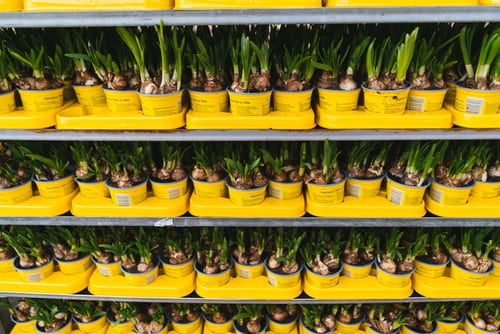Flower bulbs are the vegetative production organs that are easy to upkeep and establish solutions in your rejuvenating garden. These flower bulbs are bigger than the normal seeds and can be easily sowed and harvested without much hassle. Bulbils are modified stems in the flowering plants that develop from beneath the ground, they are a small part of a plant fused with the leaves and roots together. The flowering plants are adequate for those busy people who don’t have much time to plant but don’t want to miss them.
What makes flower bulbs ideal for your garden’s outlook?
They are a self-reliable plant specie
Flowering bulbs have a distinct edge over the regular plants that is the ability to reserve energy for elongated periods and growing seasons. These energy reserves are utilized eventually for nurturing the roots, shoots, leaves, and flowers of the plant. As they are self-sufficient, they don’t need a favorable condition such as weather or temperature to depend on. It helps you plant a bulb without constantly taking care of it.
You need not devote a lot of considerable time
Planting usually isn’t an easy job since it takes time and requires the plantsman/woman to be disciplined and patient. But in this competitive work sphere demanding you to be on your feet all the time, sparing much time for gardening might be taxing. Thus, planting bulbils is a suitable gardening option to make your Sundays more relaxing, greener, and nourishing.
Easy to accommodate
Bulb plants are also a wholesome package that is easier to plant and flooded with nutrients. This makes these plants flexible to thrive in most soil conditions since these plants do not rely on fertile soil types to flourish. Bulbs are not finicky in terms of requiring specific favorable conditions to grow, unlike traditional planting.
Low-maintenance
Flowering plants can be grown in gardens, pots, containers, or even in shrubs and trees. They subtly adapt according to your environment and the place of planting. Planting these little ones doesn’t require too much effort. These plants have the caliber to survive any weather condition and terrain. Along with this, they do not crave excessive rainfall, moisture, or sunlight exposure.
Offering greater alternatives
You also get plenty of alternatives in terms of flowering bulbs. Many of these bulbs are wildflowers, the rest are Tulips, Daffodils, Scilla, Crocuses, Snowdrops, and plenty more. The variety of flowering bulbs depends on the seasons, for instance, daffodils, tulips are spring bulbs. Hyacinth, Gloriosa, and Freesia are summer bulbs while Gladiolas, lilies, and Dahlia are harvested in winter. If you want to try something different you can also consider having a pond in your backyard. Of course, you have to have the right amount of space, time and climate for it.
You can easily plant these bulbs for blossoming results in spring when their growth is fast-paced. In summers, flower bulbs will nurture well in the heat without any fuss. They will also add the right foliage and bling of green to your garden. Lastly, in winters flowering bulbs like Snowdrops bloom efficiently surviving the cold temperatures with ease. These plants start to flower and bring elegance coupled with charm to your garden in chilly winters.
Flower bulbs are a perfect blend of vibrance, low-cost as well as maintenance, self-sustainable, and faster to set up and manage. These plants do not require fertilizers or additional manures to thrive, which makes them eco-friendly and desirable.



